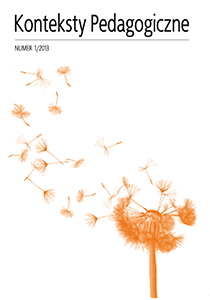Abstract
The Growth through Play System (GPS) therapy, developed by Kat Houghton, combines positively verified elements of various non-directive pro-grams which concentrate on relations and the brain with a view to determining proper therapeutic actions that would be focused on communication, social, emo-tional and cognitive development. This approach is based on the assumption that autism is primarily a disorder of social relationships. Supporting children with autism by initiating spontaneous relations with others is crucial to the Growth through Play System. Relationships and social interaction, in particular that initi-ated by the child, are key in its development and further learning. According to the assumptions of the Growth through Play therapy interactions are initiated at specified times, because the efficiency of the learning process depends on the child’s motivation and the condition of its sensory system at a given moment. The Growth through Play System is very flexible, as it may constitute a complete therapeutic program for a child with autism and autism-related challenges or com-plement any other treatment method. It may be applied by parents working with their child only for a few hours a week or by large therapeutic groups comprising parents, friends and volunteers involved in children’s home programs.
References
Baurer J., Empatia. Co potrafią neurony lustrzane. Łączenie wątków w spójną teorię, przeł. M. Guzowska-Dąbrowska, Warszawa 2008.
Bluestone J., Materia autyzmu, przeł. M. Dąbrowska-Jędral, A. Klimek, Warszawa 2010.
Grodzka M., Dziecko autystyczne, dziennik terapeuty, Warszawa 2000.
Houghton K., Naukowe Podstawy Systemu Growth Through Play. Wsparcie dla rodziców i terapeutów, Relate to Autism 2010.
Houghton K., Podręcznik dla rodziców – terapie, Relate to Autism 2012.
Houghton K., Parents Empowering Parents, „Training Events”, Relate to Autism 2011.
Houghton K., System Growth Through Play (Rozwój przez zabawę). Wsparcie dla rodzi-ców i terapeutów, Relate to Autism 2010.
Levy J., What can I do right now to help your child with autism, Naperville, Illinois 2007.
Olechnowicz H., Wokół autyzmu, fakty, skojarzenia, refleksje, Warszawa 2004.
Olechnowicz H., Dziecko własnym terapeutą. Jak wspomagać strategie autoterapeutyczne dzieci z dysfunkcjami więzi osobistych, Warszawa 2006.
Netografia
http://zrozumiecautyzm.pl/o-nas/#content [dostęp: 20.06.2013].
http://bycblizejsiebie.pl/listy/mama-bartka/znaczenie-izmow-i-joiningu/ [dostęp: 19.06.2013].
http://zrozumiecautyzm.pl/rodzice-jako-podstawowi-terapeuci-wspieranie-wspolnego-pola-uwagi/ [dostęp: 25.06.2013].
http://zrozumiecautyzm.pl/placz-marudzenie-napady-zlosci-pomocy/#more-616 [do-stęp: 28.06.2013]
In accordance with the recommendation of the Ministry of Science and Higher Education, which aims to counteract the practice of “ghostwriting” and “guest authorship,” all authors submitting their text for publication should attach an author’s statement which declares the contribution of each of the authors to the article. The printed and signed statement should be delivered by mail or other means to editor-in-chief Joanna Skibska or sent in the form of a scan to the following e-mail address: redakcja@kontekstypedagogczne.pl. The authors will not receive remuneration for publishing their papers. The editors reserve the right to make minor editorial changes to the articles which will not affect the substance of the article. We encourage all authors to prepare their articles in accordance with the guidelines for manuscript preparation. Download pdf file.
Authors transfer all copyrights and grant the journal the right of first publication with the work simultaneously licensed under a Creative Commons Attribution License that allows others to share the work with acknowledgement of the work's authorship and initial publication in this journal. All authors agree to the publishing of their email addresses, affiliations and short bio statements with their articles during the submission process.

